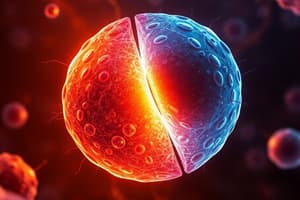Podcast
Questions and Answers
What is the primary function of cell division in multicellular organisms?
What is the primary function of cell division in multicellular organisms?
The primary function of cell division in multicellular organisms is to serve as the mechanism for tissue growth and renewal, ensuring the balance and maintenance of various cell types.
What is the main difference between mitosis and cytokinesis?
What is the main difference between mitosis and cytokinesis?
Mitosis involves the nuclear division of a cell, while cytokinesis is responsible for the division of the cytoplasm.
How do plant cells undergo cytokinesis?
How do plant cells undergo cytokinesis?
Plant cells undergo cytokinesis through the formation of a new cell wall called the cell plate.
What are the five main stages of mitosis?
What are the five main stages of mitosis?
What is the end result of the cell division process?
What is the end result of the cell division process?
What is the role of mitosis in eukaryotic cells?
What is the role of mitosis in eukaryotic cells?
What is the main difference in the way cell growth is regulated in different tissues of the body?
What is the main difference in the way cell growth is regulated in different tissues of the body?
What is the purpose of cell cycle checkpoints in cell division?
What is the purpose of cell cycle checkpoints in cell division?
What is the significance of understanding the mechanisms and regulation of cell division?
What is the significance of understanding the mechanisms and regulation of cell division?
What are some factors that can influence cell division?
What are some factors that can influence cell division?
What is the role of cell division in multicellular organisms?
What is the role of cell division in multicellular organisms?
What is the common mechanism of cell growth in most tissues of the body?
What is the common mechanism of cell growth in most tissues of the body?
Flashcards are hidden until you start studying
Study Notes
Cell Division: An Overview
Cell division is a fundamental biological process that plays a crucial role in the growth and maintenance of living organisms. In multicellular organisms, cell division serves as the primary mechanism for tissue growth and renewal, ensuring the balance and maintenance of various cell types. In unicellular organisms, cell division is the means of reproduction.
Phases of Cell Division
Cell division is comprised of two main processes: mitosis and cytokinesis. Mitosis involves the nuclear division of a cell, while cytokinesis is responsible for the division of the cytoplasm, ultimately resulting in the formation of two identical daughter cells.
Mitosis
Mitosis is a process that occurs in eukaryotic cells and involves the replication of chromosomes followed by their separation and distribution to the two daughter cells. There are five main stages in mitosis: prophase, prometaphase, metaphase, anaphase, and telophase. During these stages, the chromosomes condense, align at the metaphase plate, separate, and are distributed to the two daughter cells.
Cytokinesis
Cytokinesis is the process that follows mitosis and involves the division of the cytoplasm. In animal cells, cytokinesis is achieved through the constriction of the cell by a ring of contractile microfilaments, while in plant cells, the cytoplasm is divided by the formation of a new cell wall called the cell plate.
Regulation of Cell Division
The growth and division of different cell populations are regulated in different ways, but the basic mechanisms are similar throughout multicellular organisms. For example, most tissues of the body grow by increasing their cell number, but this growth is highly regulated to maintain a balance between different tissues. Some tissues, such as heart muscle, nerve cells of the central nervous system, and lens cells in mammals, have a greatly reduced capacity to renew damaged or diseased cells.
Factors Influencing Cell Division
Cell division can be influenced by various factors, such as nutrients, growth factors, and the presence of DNA damage. Cell cycle checkpoints are mechanisms within the cell that ensure the fidelity and continued viability of mitotic division.
Conclusion
Cell division is a complex and highly regulated process that plays a vital role in the growth, maintenance, and renewal of tissues in multicellular organisms. Understanding the mechanisms and regulation of cell division is crucial for gaining insights into various biological processes and for the development of new therapeutic strategies in medicine.
Studying That Suits You
Use AI to generate personalized quizzes and flashcards to suit your learning preferences.




